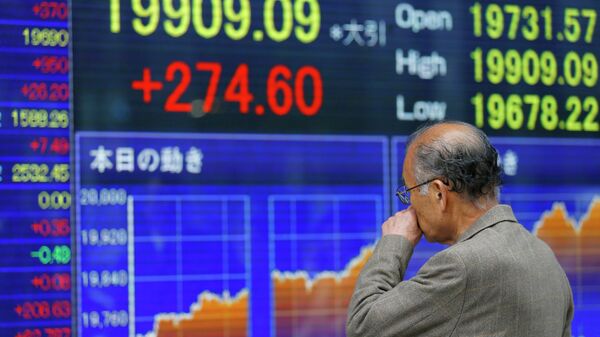Kristian Rouz — On Friday, equity markets in Asia-Pacific held firm after dipping to a one-month low yesterday, with stocks in Japan, Hong Kong, and mainland China advancing on the overnight rebound in the value of US Treasuries. Even though Beijing posted disappointing foreign trade data, the increased UK confidence propelled the regional stock indices up with their valuation over fundamentals, increasing market volatility as a result. Investors are also awaiting US jobs data due Friday.
Investors picked up the thread of buying governmental debt worldwide after yields hit dangerously high levels, with German bunds yielding 0.8%, French bonds yielding 1% and yields on Italian and Spanish bonds reaching 2% on Thursday. The rout reversed in the US Thursday night, with Treasuries gaining overnight after yields grew making the the bonds too appealing to remain in low demand, and investors rushed back into the fixed-income market.
The yield on the US Treasuries snapped its eight-session winning streak, retreating to the safer 2.155% compared to Thursday's peak of 2.321%.
Mainland China's stock indices were up 2.28% in Shanghai. The gains could be bigger, but the frustrating news of China's exports having fallen an annualized 6.4% in April, compared to the anticipated buildup of 2.4%, undermined Chinese shares.
Hong Kong's Hang Seng Index rose 1.05%, while Korea's Kospi added 0.1%. Australia's S&P/ASX 200 Index slipped 0.2% on the Chinese pessimism, as weaker Chinese exports suggest the mainland is set to import less Aussie raw materials as well. In April, mainland China's imports slumped by 17.3%, indicating the nation its losing its role of the regional growth driver.
Investors are now keeping their eye on the US jobs report for April. After adding a shameful 126,000 jobs in March, the US is expected to have hired 224,000 workers in April. If the forecast figure is surpassed or at least confirmed, global stocks are more likely to post gains, while new disappointments in the US expansion would only put into question the prospects of global economic growth.
Commodities fell on Friday, with US crude sliding to $58.86/bbl extending Thursday's losses of 3.3%, the greatest decline since 8 April. Brent crude, the global benchmark, slid 0.24% to 66.38/bbl.
In currencies, the advance of the British pound sterling was the event of the day, with the pound adding 1.5% to $1.5390 on the wave of Conservative optimism. The euro slid to $1.1251 from Thursday's three month high of $1.1392, as European bond yields fell, while concerns of the Greek debt situation arisen once again. On Thursday, Athens declined the demand of international investors to cut pensions and government sector jobs, jeopardizing progress in the negotiations over financial aid to the heavily indebted Mediterranean nation.



